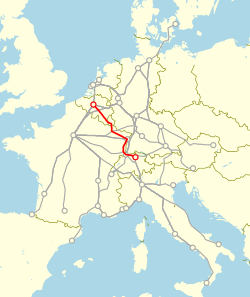Iris (train)
 TEE Iris departing from Zürich HB, 1979. | |||||
| Overview | |||||
|---|---|---|---|---|---|
| Service type | Trans Europ Express (TEE) (1974–1981) InterCity (IC) (1981–1987) EuroCity (EC) (since 1987) | ||||
| Status | Withdrawn | ||||
| Locale | Belgium Luxembourg France Switzerland | ||||
| First service | 28 May 1974 | ||||
| Last service | 2 April 2016 | ||||
| Current operator(s) | NMBS/SNCB CFL SNCF SBB-CFF-FFS | ||||
| Route | |||||
| Termini | Brussels Midi/Zuid Chur / Basel SBB | ||||
| Service frequency | Daily | ||||
| Train number(s) | EC 96/97 | ||||
| Technical | |||||
| Track gauge | 1,435 mm (4 ft 8+1⁄2 in) | ||||
| Electrification | 15 kV AC, 16.7 Hz (Switzerland) | ||||
| |||||
The Iris was an express train that linked Brussels Midi/Zuid in Brussels, Belgium, with Chur station in Chur, Switzerland.
Introduced in 1974,[1] the train was operated by the National Railway Company of Belgium (NMBS/SNCB), the Chemins de Fer Luxembourgeois (CFL), the French National Railway Corporation (SNCF) and the Swiss Federal Railways (SBB-CFF-FFS). It was named after a flower, the Yellow Iris (Iris pseudacorus), which was widespread in the Zenne/Senne valley, where Brussels is located.
Initially, the Iris was a first-class-only Trans Europ Express (TEE). In 1981, it became a two-class InterCity (IC), and on 31 May 1987, it was included in the then-new EuroCity (EC) network.[2] As of 2015[update], the Iris was one of two EuroCity train-pairs running daily between Brussels and Switzerland; the other was the Vauban.[3]
History
The eastbound service was cut back to Brussels–Basel in December 2011; in December 2013 the latter was also cut back to start in Basel.
The service was discontinued on April 3 2016, alongside the introduction of a high-speed TGV service to Strasbourg.[4]
See also
- History of rail transport in Belgium
- History of rail transport in Luxembourg
- History of rail transport in France
- History of rail transport in Switzerland
- List of EuroCity services
- List of named passenger trains of Europe
References
Notes
- ^ "Summer services, 1974" (changes due to take effect). Thomas Cook Continental Timetable (March 29–April 25, 1974 edition), p. 465. Peterborough, UK: Thomas Cook Publishing.
- ^ Thomas Cook Continental Timetable (May 31–June 30, 1987 edition), pp. 472, 475. Thomas Cook Publishing.
- ^ "EuroCity trains: traditional international daytime trains". NMBS/SNCB. Retrieved 23 March 2013.[dead link]
- ^ "Traffic disruptions and alterations". SNCB International. NMBS/SNCB. Archived from the original on 2016-04-01.
Bibliography
- Goette, Peter; Willen, Peter (2006). TEE-Züge in der Schweiz sowie Schweizer TEE-Züge im Ausland [TEE Trains in Switzerland as well as Swiss TEE Trains abroad]. Freiburg i.B.: EK-Verlag. ISBN 978-3-88255-697-1. (in German)
- Malaspina, Jean-Pierre; Mertens, Maurice (2007). TEE: la légende des Trans-Europ-Express [TEE: The Legend of the Trans Europ Express]. Auray: LR Presse. ISBN 978-29-03651-45-9. (in French)
- Malaspina, Jean-Pierre; Mertens, Maurice (2008). TEE: la leggenda dei Trans-Europ-Express [TEE: The Legend of the Trans Europ Express]. Salò: ETR – Editrice Trasporti su Rotaie. ISBN 978-88-85068-31-5. (in Italian)
- Mertens, Maurice; Malaspina, Jean-Pierre; von Mitzlaff, Berndt (2009). TEE - Die Geschichte des Trans-Europ-Express [TEE - The History of the Trans Europ Express]. Düsseldorf: Alba Publikation. ISBN 978-3-87094-199-4. (in German)
External links
![]() Media related to Iris at Wikimedia Commons
Media related to Iris at Wikimedia Commons
- Rail.lu: Iris – images of the train


